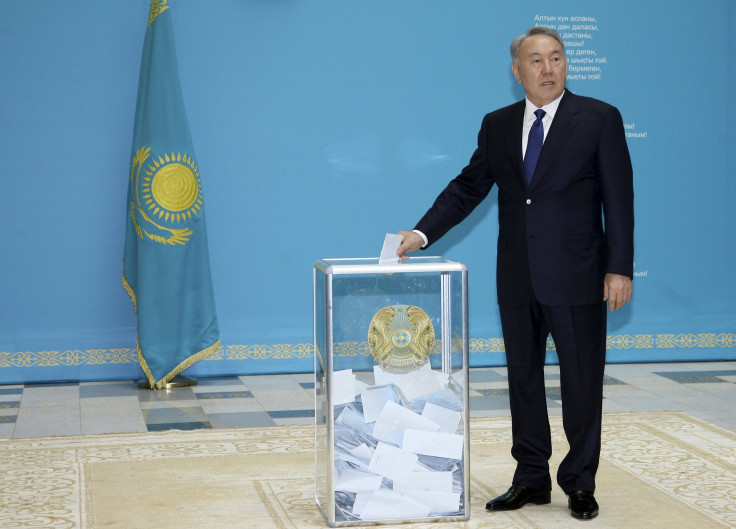Kazakh Leader Sails To Re-Election With 'Stability' Mantra

ASTANA (Reuters) - Kazakh President Nursultan Nazarbayev was set to renew his 26-year grip on power on Sunday, offering the multi-ethnic Central Asian state economic and social stability in return for what rights groups call systematic suppression of opposition.
Nazarbayev, 74, officially titled "Leader of the Nation", called presidential elections more than a year early in a move that could quash any speculation about a successor. He faces no real challenge from the other contenders, a low-profile Communist Party functionary and a loyal ex-regional governor.
Upbeat and smiling, the former steelworker appeared confident of his landslide win as he voted in his futuristic capital Astana.
"I am confident ... Kazakhstanis will vote for stability in our state, to support the policy which the country has so far been following under my leadership," he told reporters after casting his ballot at polling station No. 81 in central Astana.
"I am confident people will vote for their future and the future of their children, for our flourishing Kazakhstan."
Nazarbayev has promoted market reforms and, with the help of more than $200 billion in foreign direct investment, turned his steppe nation into the second-largest economy in the former Soviet Union and the biggest former Soviet oil producer after Russia.
Kazakhstan has built good ties with neighbors Russia and China and developed warm relations with the United States and the European Union.
As the vote started at 7 a.m. (0100 GMT), queues for ballots formed quickly at the polling station in the cavernous Schoolchildren's Palace, where Nazarbayev voted later.
"I voted for our beloved Nazarbayev, of course," said Vera Kalinina, a 68-year-old pensioner, as joyous Kazakh songs blared from loudspeakers.
"He gave us everything - pensions, free medications, we have food. What else do we need? God give him good health."
DEMOCRACY CAN WAIT
Stable in a region that has been troubled by ethnic violence and includes Afghanistan, Kazakhstan has been criticized by the West and human rights bodies for crackdowns on dissent. No election held here has yet been given a clean bill of health by monitors.
Most of Nazarbayev's vocal critics have either been jailed or fled the country.
The biggest challenge to his authority has been a riot in the western oil town of Zhanaozen and a nearby village in 2011 where police opened fire, killing at least 15 people.
A prominent opposition leader was jailed after the Zhanaozen riot, which the authorities described as an attempted coup to topple the government.
Nazarbayev's references to conflicts in some parts of the former Soviet Union appeal to many of his young compatriots who have grown up knowing no other leader.
"We all voted for Nazarbayev, because he is our true leader. We have got used to him, we trust him, There will be stability with him," said Dina Dosmukhanova, a 20-year-old foreign languages student who voted in Kazakhstan's financial center and biggest city, Almaty.
"There will be no revolt here - like in Ukraine, for instance," she said.
Nazarbayev, a former member of the Soviet Union's ruling Politburo, says before launching democratic reform, he aims to build a strong state and ensure prosperity for a population including Kazakhs, Russians, Ukrainians, ethnic Germans and Tatars.
With the same mantras of stability, inter-ethnic harmony and social cohesion, he won nearly 96 percent of the vote in the previous election in April 2011.
As of noon (0600 GMT), 41.69 percent of Kazakhstan's 9.5 million eligible voters had cast their ballots, the Central Election Commission said. Voting ends at 8 p.m. local time.
(Writing by Dmitry Solovyov; Additional reporting by Mariya Gordeyeva in Almaty; editing by Ralph Boulton and William Hardy)
© Copyright Thomson Reuters 2024. All rights reserved.





















